Hangovers Due to Guilty Conscience
In 1973, Professor Robert Gunn advanced this theory.

Twenty years later, he was still pursuing the idea, as you can see in the scientific paper at the link.

Twenty years later, he was still pursuing the idea, as you can see in the scientific paper at the link.
To reappraise a prior study of hangover signs and psychosocial factors among a sample of current drinkers, we excluded a subgroup termed Sobers, who report "never" being "tipsy, high or drunk." The non-sober current drinkers then formed the sample for this report (N = 1104). About 23% of this group reported no hangover signs regardless of their intake level or gender, and the rest showed no sex differences for any of 8 hangover signs reported. Using multiple regression, including ethanol, age and weight, it was found that psychosocial variables contributed independently in predicting to hangover for both men and women in this order: (1) guilt about drinking; (2) neuroticism; (3) angry or (4) depressed when high/drunk and (5) negative life events. For men only, ethanol intake was also significant; for women only, being younger and reporting first being high/drunk at a relatively earlier age were also predictors of the Hangover Sign Index (HSI). These multiple predictors accounted for 5-10 times more of the hangover variance than alcohol use alone: for men, R = 0.43, R2 = 19%; and for women, R = 0.46, R2 = 21%. The findings suggest that hangover signs are a function of age, sex, ethanol level and psychosocial factors.
Comments
Preposterous. “There are lies, damned lies, and statistics.”
Posted by Virtual on 02/11/19 at 12:12 PM
Commenting is not available in this channel entry.

Category: Science | Experiments | Psychology | 1970s | 1990s | Pain, Self-inflicted and Otherwise | Alcohol